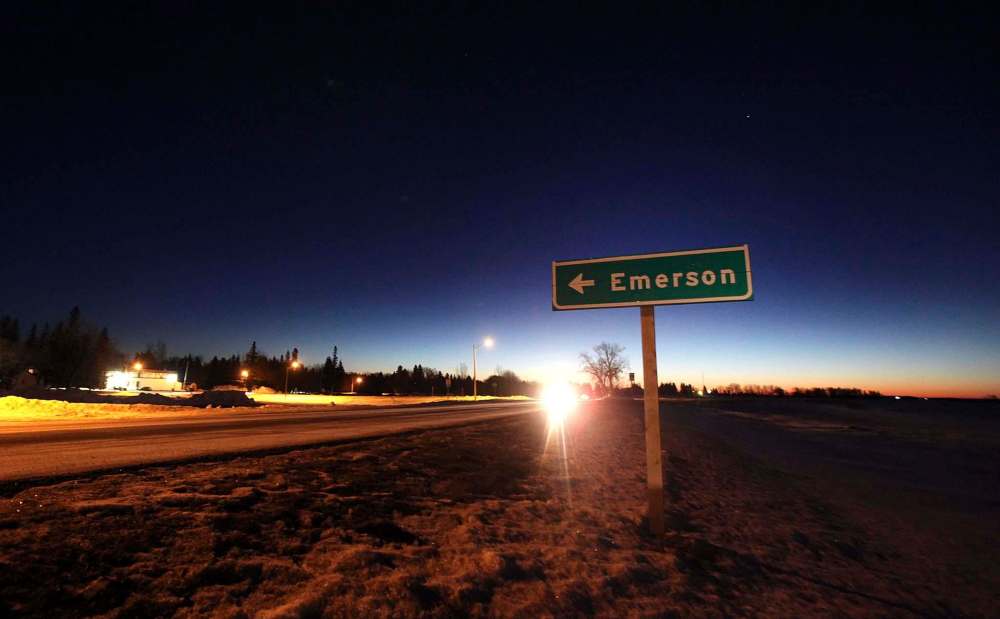Flow of asylum seekers into province from U.S. levels off
Advertisement
Read this article for free:
or
Already have an account? Log in here »
To continue reading, please subscribe:
Monthly Digital Subscription
$0 for the first 4 weeks*
- Enjoy unlimited reading on winnipegfreepress.com
- Read the E-Edition, our digital replica newspaper
- Access News Break, our award-winning app
- Play interactive puzzles
*No charge for 4 weeks then price increases to the regular rate of $19.00 plus GST every four weeks. Offer available to new and qualified returning subscribers only. Cancel any time.
Monthly Digital Subscription
$4.75/week*
- Enjoy unlimited reading on winnipegfreepress.com
- Read the E-Edition, our digital replica newspaper
- Access News Break, our award-winning app
- Play interactive puzzles
*Billed as $19 plus GST every four weeks. Cancel any time.
To continue reading, please subscribe:
Add Free Press access to your Brandon Sun subscription for only an additional
$1 for the first 4 weeks*
*Your next subscription payment will increase by $1.00 and you will be charged $16.99 plus GST for four weeks. After four weeks, your payment will increase to $23.99 plus GST every four weeks.
Read unlimited articles for free today:
or
Already have an account? Log in here »
Hey there, time traveller!
This article was published 27/10/2017 (2958 days ago), so information in it may no longer be current.
The rising tide of asylum seekers crossing into Manitoba on foot seems to have settled into a steady stream, while the numbers in Quebec dropped dramatically last month.
Welcome to the rhythms of a world of displaced people, a Winnipeg immigration expert says.
“You can’t plan for refugee claimants,” said Lori Wilkinson, director of Immigration Research West at the University of Manitoba, and editor-in-chief of the Journal of International Migration and Integration.

RCMP intercepted 78 refugee claimants who’d irregularly crossed the border from the United States into Manitoba in September, compared with 80 in August, Immigration, Refugees and Citizenship Canada’s latest numbers show.
In Quebec, the number of asylum claims dropped dramatically — to 1,720 in September from 5,530 in August.
“They fluctuate so much every year,” said Wilkinson, who will be one of the speakers at the Strangers in New Homelands conference in Winnipeg from Nov. 1-3. The conference, in its 10th year, looks at immigration policies in host societies around the world. The issue of refugee claimants is one of the big topics this year, she said.
This summer, the number of refugee claimants who crossed into Quebec grew, with Haitian earthquake refugees trying to get to a safe place before their temporary protected status in the U.S. expired. In the fall, their numbers plummeted.
“I would say the people who are really scared about their situation would have left already,” Wilkinson said.
The number of asylum seekers crossing into Canada could soar again if people in the U.S. with uncertain status — such as the 700,000 who arrived in the country as minors and were allowed to stay through the Deferred Action for Childhood Arrivals (DACA) program — fear they’ll get the boot.
“It will depend a lot on the (U.S. President Donald) Trump administration,” Wilkinson said.
The number of asylum seekers trying to call Manitoba home may have levelled off for now. But it’s still up 400 per cent from this time last year, says a Winnipeg non-profit group that helps refugee claimants navigate the maze of immigration bureaucracy.
“We’re managing, but still unfunded by the federal government,” said Ghezae Hagos, who is in charge of in-Canada refugee claims at the Manitoba Interfaith Immigration Council’s Welcome Place.
In September 2016, it helped 24 refugee claimants. Last month, it assisted 104. By mid-October 2016, it had helped 198 refugee claimants; by mid-October this year, it was 1,000, Hagos said.
Every weekday, four University of Manitoba law students spend a half-day at Welcome Place, working with refugee claimants, mostly helping them draft their “narratives” — their story, and why they have a well-founded fear of persecution should they be sent back to their country of origin.
Welcome Place — the largest resettlement agency for government-assisted refugees — is providing settlement services for refugee claimants, for which there is no federal government funding, Hagos said.
“They’re asking us for winter clothes, shoes and furniture,” he said, asking donors to take gently-used items to the Canadian Muslim Women’s Institute (61 Juno St.). The province, as well as donors, has stepped up to help. But the need for shelter is great, he said.
“Some are really struggling.”
carol.sanders@freepress.mb.ca

Carol Sanders
Legislature reporter
Carol Sanders is a reporter at the Free Press legislature bureau. The former general assignment reporter and copy editor joined the paper in 1997. Read more about Carol.
Every piece of reporting Carol produces is reviewed by an editing team before it is posted online or published in print — part of the Free Press‘s tradition, since 1872, of producing reliable independent journalism. Read more about Free Press’s history and mandate, and learn how our newsroom operates.
Our newsroom depends on a growing audience of readers to power our journalism. If you are not a paid reader, please consider becoming a subscriber.
Our newsroom depends on its audience of readers to power our journalism. Thank you for your support.

